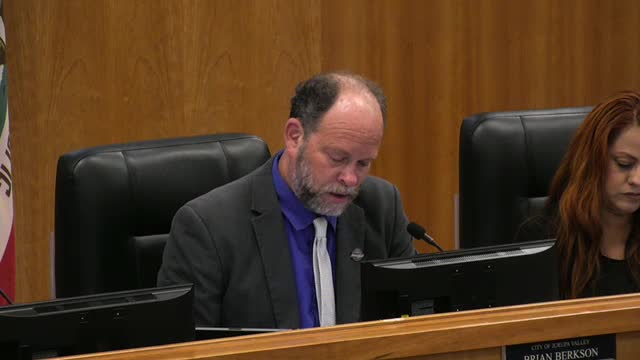Riverside Transit Agency Approves Three-Year Micro Transit Extension for Hemet and San Jacinto
October 02, 2025 | Jurupa Valley, Riverside County, California
This article was created by AI summarizing key points discussed. AI makes mistakes, so for full details and context, please refer to the video of the full meeting. Please report any errors so we can fix them. Report an error »

Jurupa Valley City Council members discussed several significant updates during their recent meeting on October 2, 2025, with a focus on transportation improvements and future planning for major events.
One of the key highlights was the approval of a three-year extension for micro transit services in Hemet and San Jacinto. This decision follows a successful initial two-year period, which resulted in a remarkable $2 million savings compared to traditional fixed-route bus services. The new micro transit system, utilizing smaller vans, has proven to be more efficient and effective, successfully transferring a higher number of passengers. Council members expressed hope that similar services could eventually be implemented in Jurupa Valley.
Additionally, the council approved a uniform contract for Riverside Transit Agency employees, ensuring consistency in appearance across the workforce. They also sanctioned a one-year agreement with the option for four annual extensions for a company to manage Oracle computer software, which supports transit operations.
A significant discussion point was the potential elimination of committee meetings for Metrolink, with three out of four council members opposing the motion. Despite the decision to reduce meetings starting in January, concerns were raised about the potential for longer board meetings as a result.
In terms of infrastructure, a $177 million contract was issued for track and signal maintenance, supported by a $52.6 million grant aimed at replacing older locomotives with more environmentally friendly tier 4 models. This upgrade is expected to significantly reduce air contaminants.
Looking ahead, the council is preparing for the 2026 World Cup, which will feature eight matches and an expected influx of 70,000 spectators, with 30,000 anticipated to use public transportation. Preparations are also underway for the 2028 Olympics, with ongoing efforts to secure federal funding to accommodate the expected quadrupling of train trips during the events.
As the meeting concluded, council members began discussing future agenda items, including a formal request to county supervisors to increase funding requirements for local businesses related to rate separation. This reflects the council's commitment to addressing community needs and enhancing local infrastructure.
One of the key highlights was the approval of a three-year extension for micro transit services in Hemet and San Jacinto. This decision follows a successful initial two-year period, which resulted in a remarkable $2 million savings compared to traditional fixed-route bus services. The new micro transit system, utilizing smaller vans, has proven to be more efficient and effective, successfully transferring a higher number of passengers. Council members expressed hope that similar services could eventually be implemented in Jurupa Valley.
Additionally, the council approved a uniform contract for Riverside Transit Agency employees, ensuring consistency in appearance across the workforce. They also sanctioned a one-year agreement with the option for four annual extensions for a company to manage Oracle computer software, which supports transit operations.
A significant discussion point was the potential elimination of committee meetings for Metrolink, with three out of four council members opposing the motion. Despite the decision to reduce meetings starting in January, concerns were raised about the potential for longer board meetings as a result.
In terms of infrastructure, a $177 million contract was issued for track and signal maintenance, supported by a $52.6 million grant aimed at replacing older locomotives with more environmentally friendly tier 4 models. This upgrade is expected to significantly reduce air contaminants.
Looking ahead, the council is preparing for the 2026 World Cup, which will feature eight matches and an expected influx of 70,000 spectators, with 30,000 anticipated to use public transportation. Preparations are also underway for the 2028 Olympics, with ongoing efforts to secure federal funding to accommodate the expected quadrupling of train trips during the events.
As the meeting concluded, council members began discussing future agenda items, including a formal request to county supervisors to increase funding requirements for local businesses related to rate separation. This reflects the council's commitment to addressing community needs and enhancing local infrastructure.
View full meeting
This article is based on a recent meeting—watch the full video and explore the complete transcript for deeper insights into the discussion.
View full meeting
